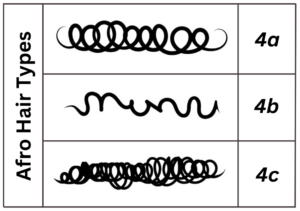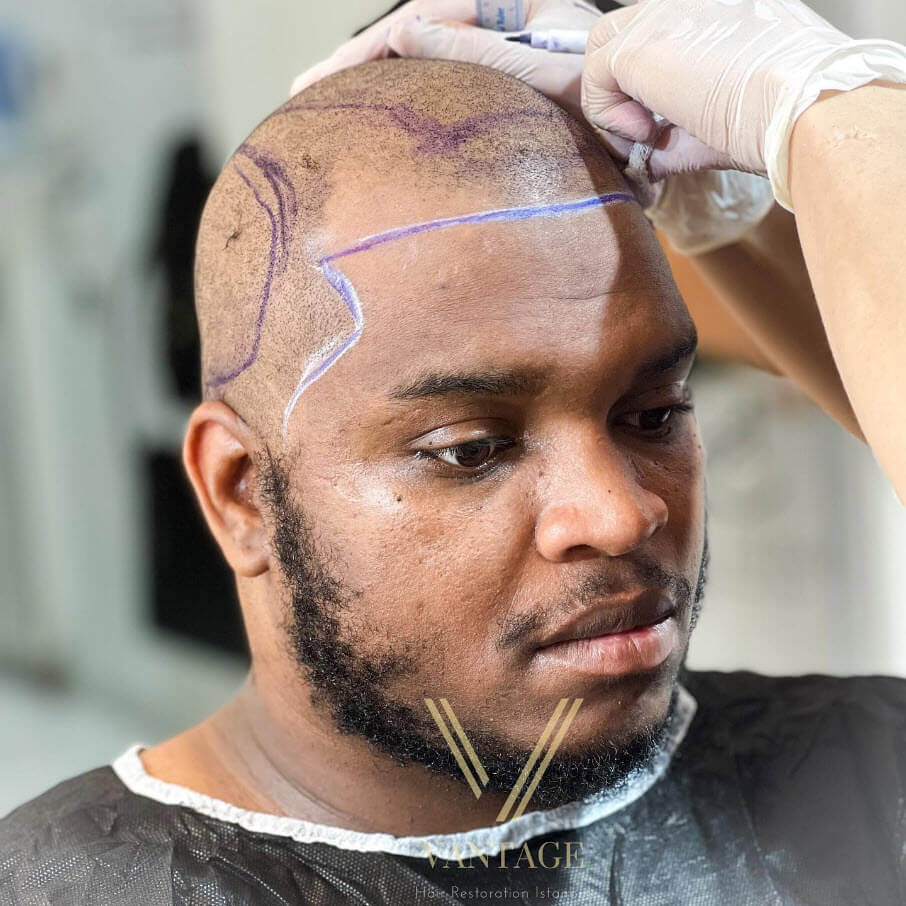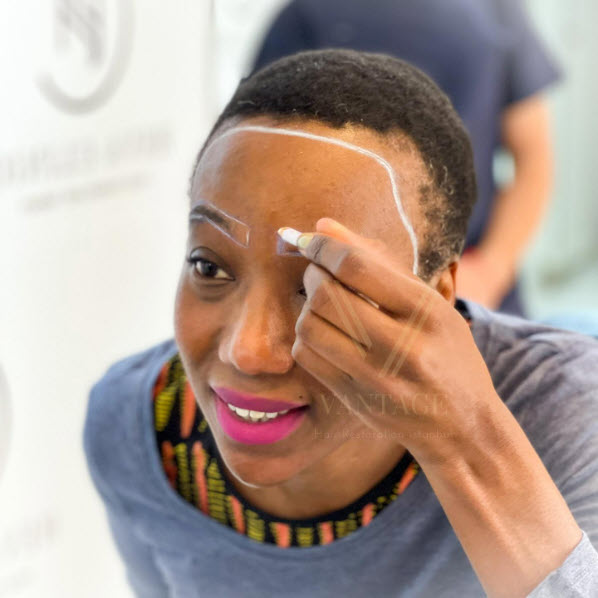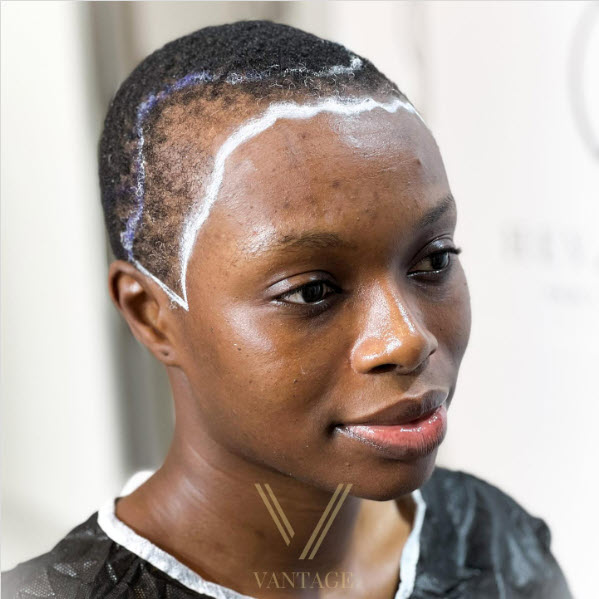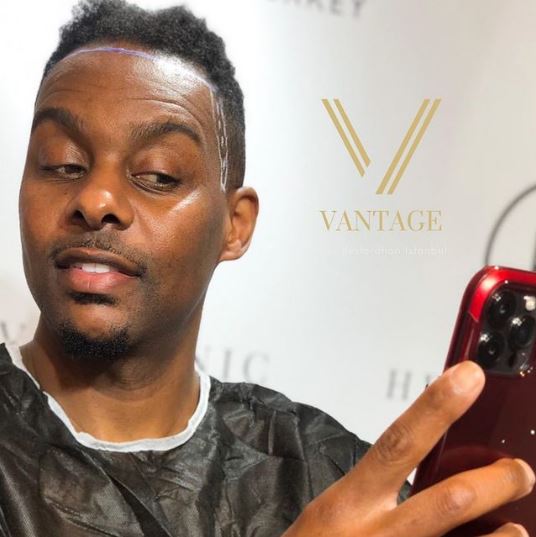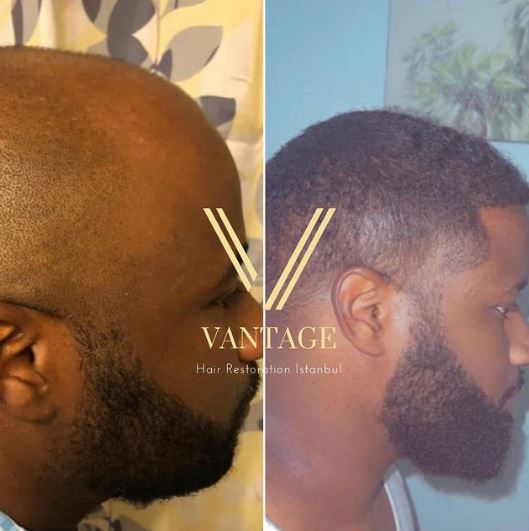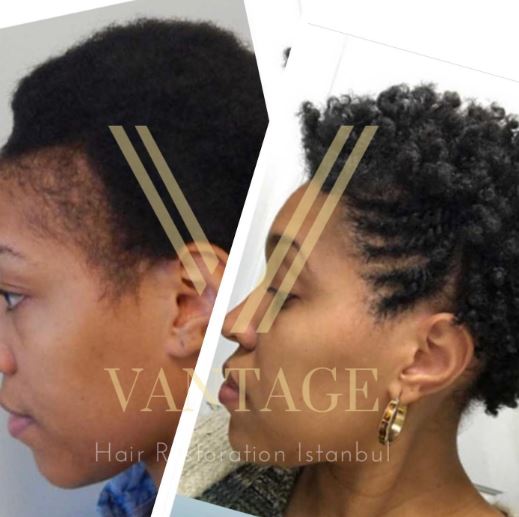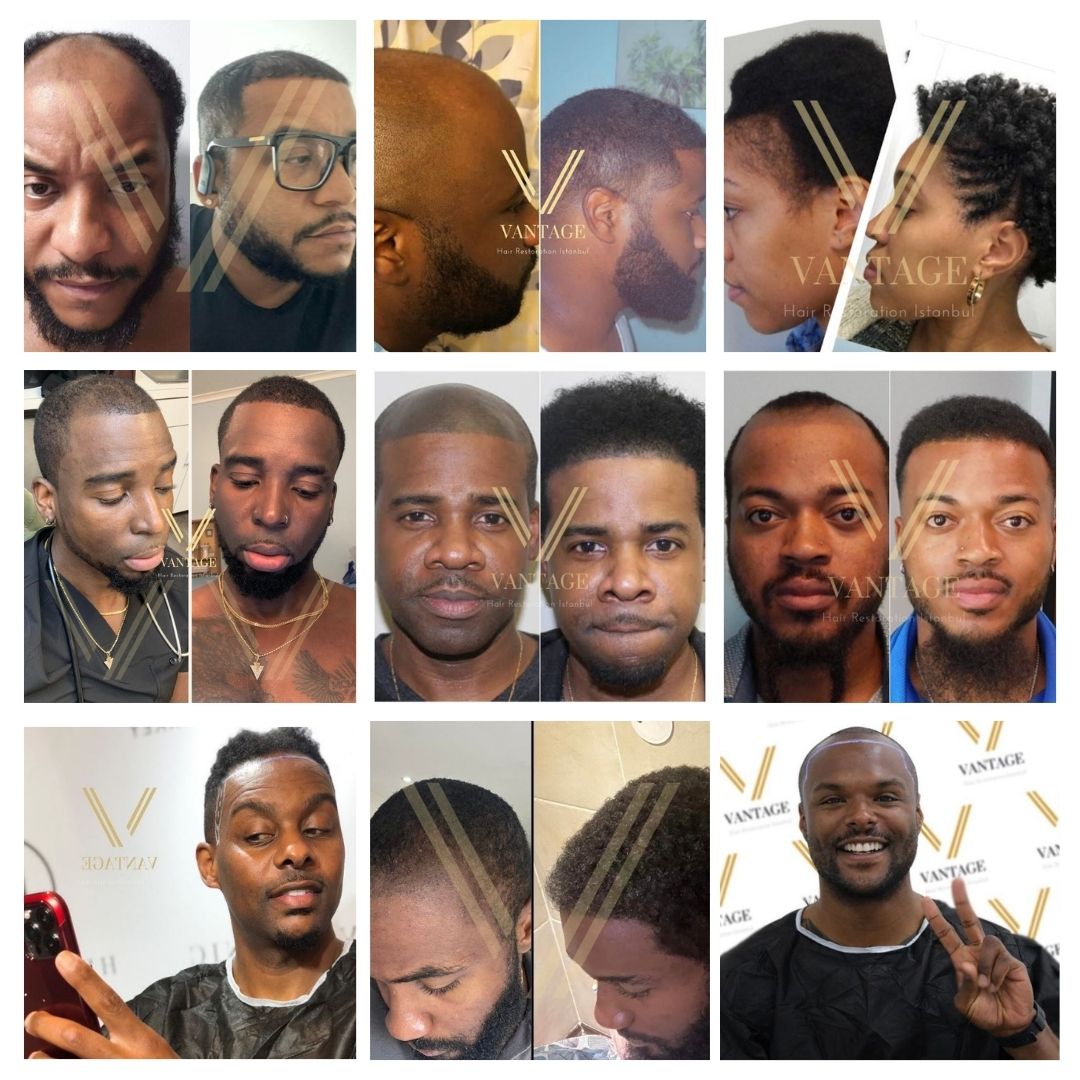
Hair loss has no age, race, or gender. In fact, Afro Caribbean individuals can experience hair loss due to hairstyles such as braids, weaves, buns, rollers, and cornrows. This is because curly hair roots require more space, so hair follicles should not be too close together. These hairstyles can gradually damage hair follicles.
Afro Caribbean individuals often have tightly curled hair, which has led many to believe that an Afro hair transplant is a complex procedure due to the structure of the hair follicles. However, the Afro hair transplant before & after photos in Turkey demonstrates that the process is straightforward for qualified ethnic hair transplant specialists in Turkey. So, without further ado, let’s delve into the details of getting Afro hair transplant in Turkey.
How much is too much hair loss for Afro hair?
Afro hair may seem thicker and denser than straight hair, but in reality, it is thinner. This makes it more brittle and difficult to style. Typically, tight hairstyles and poor hair care practices are the leading causes of Afro hair loss.
On average, people lose between 50-100 hair strands per day, depending on their hair type. However, losing more than 200 strands per day is considered excessive and may indicate extensive hair loss. A receding hairline is another sign of significant hair loss. You may notice that your hair is not as dense as usual when trying different hairstyles, which can be a clear indicator of hair loss. In such cases, a hair transplant may be a viable option to permanently treat hair loss.
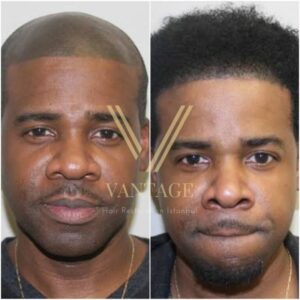
What are the causes of Afro hair loss?
Hair loss can be triggered by several elements, with stress being the primary factor. As with many other health conditions, stress can also indicate hair loss. When experiencing stress, one may develop trichotillomania, which is the unconscious urge to pull out hair. In addition to this, stress can also lead to traction alopecia, which is a sudden hair loss due to stress, anxiety, and other similar factors.
Another reason for hair loss can be an autoimmune disease, such as alopecia areata. This condition causes small, round patches of hair loss across the scalp. Another factor that can contribute to hair loss is an imbalanced diet, as hair follicles may not get the necessary nutrients to thrive. Additionally, Afro hair loss can be caused by tight hairstyles, such as dreadlocks, which involve pulling, twisting, and braiding.
To treat hair loss effectively, it is crucial to identify the cause of hair loss. With that action, you can consult our medical consultants to learn more about the procedure and determine the best course of action.
Can Afro hair be transplanted?
While many people think that Afro hair cannot be transplanted as straight hair, it is actually feasible to achieve seamless results by getting Afro hair transplant in Turkey. The voluminous nature of Afro hair makes it easier to hide traces of the hair transplant as it recovers. This is because Afro hair is more voluminous than Caucasian hair, making it easier to create a fuller look. Additionally, the unique texture and distinct tight curls of Afro hair make achieving a voluminous hair appearance easier, resulting in a successful outcome.
Afro hair transplant for men
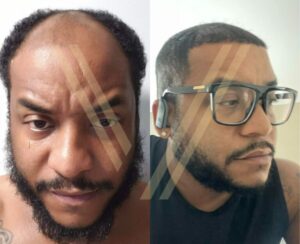
Hair loss is a common issue among both Afro Caribbean men and women. Androgenetic alopecia is one of the main reasons for hair loss in men. However, a hair transplant is a feasible option for treating androgenetic hair loss in Afro-American individuals as well.
It is important to note that due to the unique structure of Afro hair follicles, it is essential to transplant hair at the right angle. This requires the expertise of a qualified surgeon specializing in this field to ensure the success of the transplant. Therefore, choosing a qualified surgeon who can perform the transplant with precision and accuracy is vital.
Afro hair transplant for women
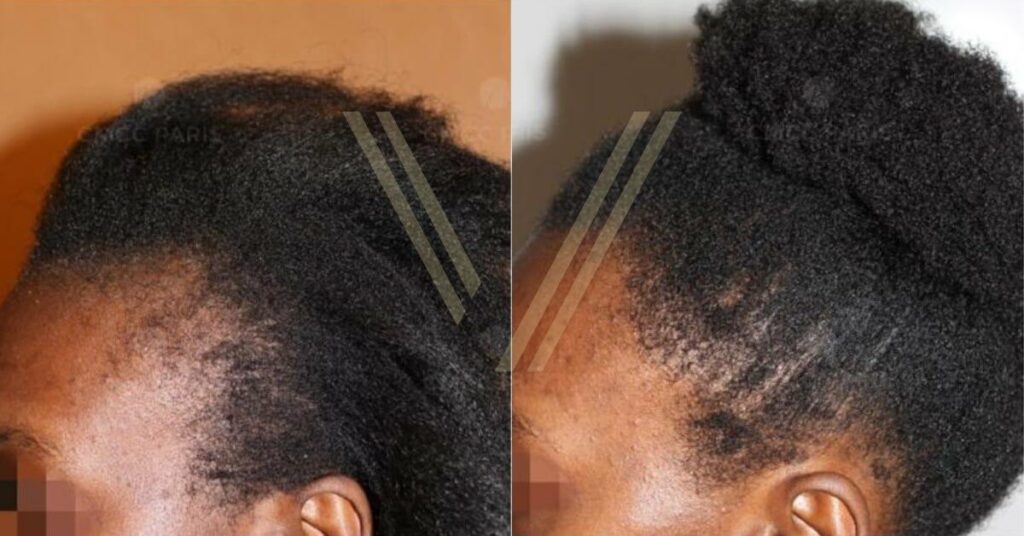
Hair loss is a common problem experienced by Afro women, usually caused by tight hairstyles like braids, cornrows, and dreadlocks. This type of hair loss is called traction alopecia, but it can be treated with a female hair transplant options.
For women, hair transplants are often associated with female pattern baldness, which might make Afro Caribbean women hesitant to opt for such procedures. Afro hair transplant methods can address thinning hair, leading to increased hair density and natural growth for both genders.
Do hair transplants work on Afro hair?
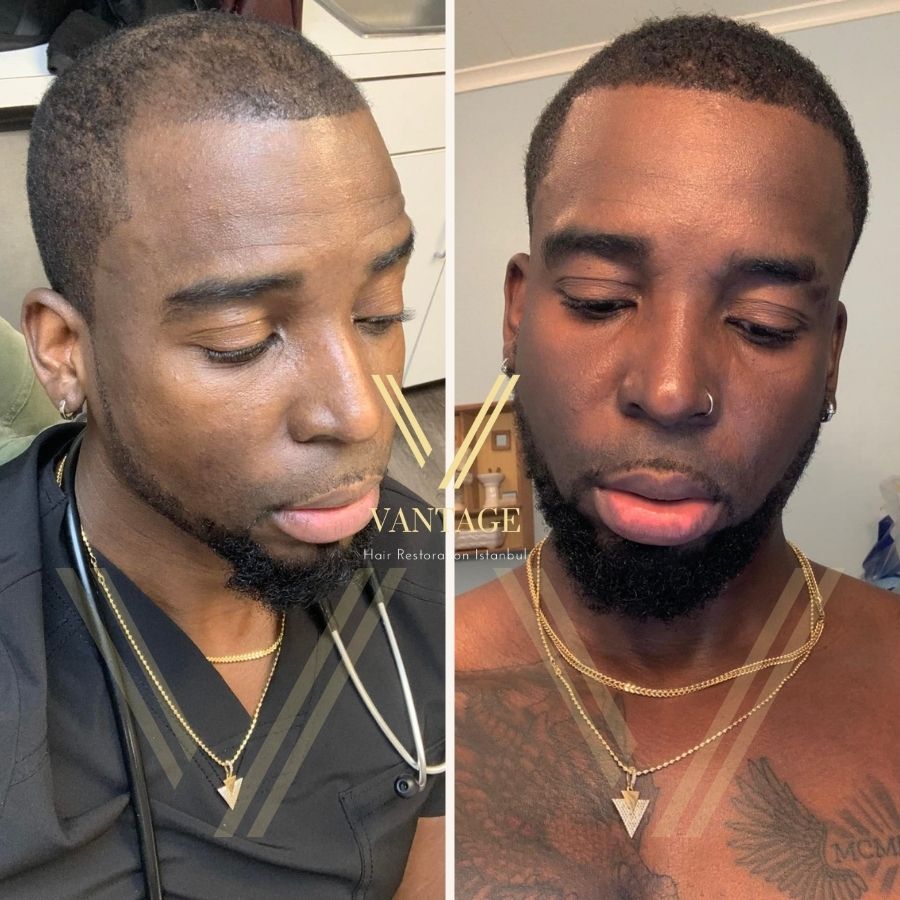
Hair transplant methods are considered the most effective option for treating hair loss permanently, and this applies to everyone, including individuals of Afro-Caribbean descent. However, due to the curly texture of Afro hair follicles, extracting and transplanting hair grafts can be challenging. Therefore, it is essential to have a qualified and experienced surgeon who can perform an Afro hair transplant with precision. When done correctly, Afro hair transplant procedures have a high success rate of up to 98%.
Is black hair harder to transplant?
Transplanting black hair follicles can be challenging due to their unique structure. The tight curl pattern of the hair increases the potential for damage during extraction. Only experienced surgeons who are familiar with working with afro hair can prevent this by using specialized techniques during the transplant procedure.
Does hair transplant work for 4c hair?
The 4C hair type is known for being coily, thick, and tightly packed, which can make it difficult to manage. Unlike curly hair, 4C hair has a more defined coil pattern that can be challenging to identify, especially from a distance. Getting a hair transplant gives natural results for 4C hair type; however, you should keep in mind that expertise is key. So, feel free to contact to our medical consultants to learn the best treatments available for your hair type.
What are Afro hair types?
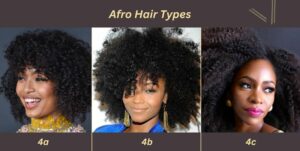
There are various types of Afro hair, and it’s essential to diagnose and treat each type correctly. The Andre Walker Hair Typing System is commonly used to classify hair types into four main categories: curly, wavy, straight, and coiled. In this system, each hair type has distinct features that distinguish it from the others. Let’s take a closer look at each hair type and its characteristics. [1]
The graphic illustrates that the defined curl pattern becomes less visible from type 4A to 4C. Additionally, hair strands become thinner as the shrinkage increases from 4A to 4C. It’s also worth noting that styling options may differ for each of these hair types due to their unique characteristics. While versatile hairstyles can be applied to 4A hair, braids and twists are more suitable for managing and maintaining hair follicles in 4C hair.
Curly Afro Hair
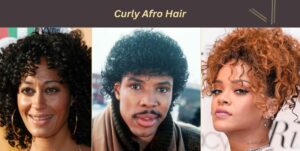
Afro hair patterns fall into 4 different categories, the most common one being curly. Up to %95 of Afro individuals have curly hair. Curly hair also falls under 3 different categories: A, B, and C, which indicates the texture within the expressed hair type. [2]
Afro hair falls into the 4th category at Andre Walker’s hair typing system. In this category, curly afro hair is classified as 4A, which indicates a hair type that has loose curls. 4A Afro hair type has S pattern loose curls, which has a visible curl pattern. Curls are well defined in this type of Afro hair, which makes it easy it style. However, since it’s loosely packed you may need to moisturize your curls frequently as it may be brittle, especially at split ends.
Wavy Afro Hair
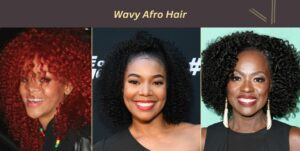
Another type of Afro hair is Wavy, which can be classified as 4b in Andre Walker’s Hair Typing System. Similar to 4A, 4B type of hair is also densely packed. Unlike 4A, it has tighter curls, so it may be more difficult to identify curl patterns at a distance. 4B Afro hair has a zigzag pattern, when you stretch it you may see a Z loosely. However, please avoid stretching hair strands when it’s dry as it may cause breakage. Moreover, it may be more challenging to style this type of hair rather curly hair. Furthermore, it’s essential to note that if you have wavy afro hair you should nurture it with oils, such as argan,coconut, jojoba since it’s prone to breakage and shrinkage.
Straight Afro Hair
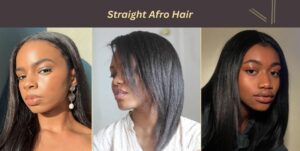
Type 1 hair is classified as straight or flat hair. This type of hair tends to be shinier since natural oils easily travel from the root to the tip of the hair. Included in this hair category are Divisions 1A, 1B, and 1C.
Type 1A hair, in particular, is characterized by its completely straight structure, devoid of any traces of curls or waves. This means that the hair is stick-straight and does not have any visible bends.
Kinky (Coilly) Afro Hair
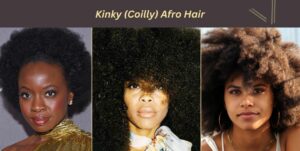
Kinky, in other words, coily hair, is classified as 4C type hair. Coily hair has small tight coils, unlike curly hair. For kinky hair, coils are small and hard to identify at a distance. Coily strands are tightly wound around each other, making the hair susceptible to snap or break without care. It’s also known as the most fragile hair type in the hair typing system. So, the hair type requires intense care. To avoid damaging hair strands while sleeping, it’s advised to sleep in a silk satin cap.
What is the success rate of black hair transplant?
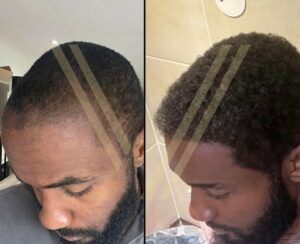
The success rate of a hair transplant is significantly higher, up to 98%, when performed by experienced surgeons. Additionally, following the post-operative care guidelines, which involve avoiding strenuous activities that may cause sweating and diligently caring for the transplanted area, can significantly improve the overall success of the transplant.
Do Afro hair transplants ever look natural?
Afro hair transplants offer natural results. Hence, due to the nature of Afro hair, it’s feasible to cover traces of hair transplant to ensure a seamless procedure. However, it’s essential to stress that to get natural results, it’s essential to extract hair follicles naturally as well.
Can transplanted afro-textured hair be styled and treated like natural hair?
After the healing process, transplanted Afro-textured hair can be styled and treated much like your natural hair. Once the transplanted hair follicles have successfully taken root and started to grow, they’re considered as your natural hair. To achieve natural-looking results, it is essential to allow the transplanted hair some time to fully establish and grow before subjecting it to excessive styling or treatment. Similar to natural hair, it will require regular maintenance, including washing, conditioning, moisturizing, and protection from heat and other potential damage.
What is the best hair transplant method for African hair?

To effectively treat hair loss in African hair, it is important to consider factors such as hair structure, the severity of hair loss, and the availability of a donor area. Our team of medical consultants is readily available to offer their expertise and help determine the best method of treatment for your unique needs.
FUE hair transplant technique for Afro hair
Usually, FUE method is the most preferred option for Afro hair transplant since it extracts and implants hai follicles individually and has potential to cover wider areas in single session.
DHI hair transplant technique for Afro hair
DHI is a popular hair transplant method for Afro hair that offers seamless results. It does not require the creation of microchannels, making the procedure quicker and more effective. With DHI, hair follicles can be extracted and transplanted easily, resulting in great outcomes.
How much does Afro hair transplant cost in Turkey?
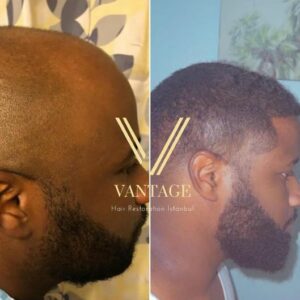
Turkey is widely recognized as a hub for medical procedures, including hair transplant, with its highly sought after methods and budget-friendly prices. Unlike other countries, hair transplant costs in Turkey are not determined by the cost per graft, making it an affordable option to treat hair loss for any ethnicity. On average, the cost of an Afro hair transplant in Turkey ranges from $2,200 to $4,000, but it’s important to keep in mind that these prices may vary based on the method chosen for the procedure, the severity of hair loss, and the expertise of the surgeon.
How much does Afro hair transplant cost in other countries?
The cost of a hair transplant procedure is typically determined by the cost per graft in most countries. For instance, an Afro hair transplant in the USA can range from $4,500 to $15,000 depending on the clinic’s location and the chosen method. In the UK, an Afro hair transplant may cost anywhere from $6,000 to $19,000, and in France, it can cost $7,000 to $18,000 or more. The price variations are often due to factors such as the clinic’s reputation, the surgeon’s expertise, and the number of grafts required. Additionally, many hair transplant clinics do not include all expenses in their packages, so you may have to cover additional costs.
Which is the best black hair transplant clinic in Turkey?
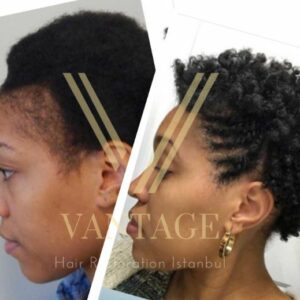
In Turkey, it can be daunting to choose from the numerous hair transplant clinics available to achieve the results you desire. However, Vantage Hair stands out from the rest as the most popular option for treating hair loss. The clinic boasts of highly skilled medical staff, warm hospitality, and top-notch services that have helped many patients realize their dream of having a full head of hair again.
Vantage Hair offers all-inclusive packages that cover everything you need for the procedure, including pre-op consultations and post-op aftercare. With Vantage, you can be assured of natural-looking results and a joyful experience throughout the process.
If you’re looking for a reliable and effective hair transplant clinic, Vantage Hair should be at the top of your list. Don’t miss out on the opportunity to achieve your hair goals with the help of Vantage Hair.
How long is the recovery for Afro hair transplant?
After undergoing an Afro hair transplant, it is common to experience a recovery period of 4-6 weeks, as this procedure is minimally invasive. You can expect to notice the initial signs of hair growth approximately 3-4 months following the surgery. However, it may take up to 12 months to see the full results of the transplant, which is important to keep in mind when considering this treatment option.
Take the first step on your rejuvenating journey by connecting with our medical consultants, who are ready to guide you through everything you need to know about the procedure. Don’t let hair loss hold you back any longer—click here to contact us via WhatsApp today!
References:
- Kymberlee, H., Adesola, A., & Prajjwhal, D. (2018). Towards Creation of a Curl Pattern Recognition System. In Proceedings of the International Conference on Image Processing, Computer Vision, and Pattern Recognition (IPCV) (pp. 30-33). https://www.researchgate.net/profile/Gloria-Washington/publication/328799161_Towards_Creation_of_a_Curl_Pattern_Recognition_System/links/6144cbb6519a1a381f68f9c0/Towards-Creation-of-a-Curl-Pattern-Recognition-System.pdf
- Proc Math Phys Eng Sci. 2019 Nov; 475(2231): 20190516. https://www.ncbi.nlm.nih.gov/pmc/articles/PMC6894537/

